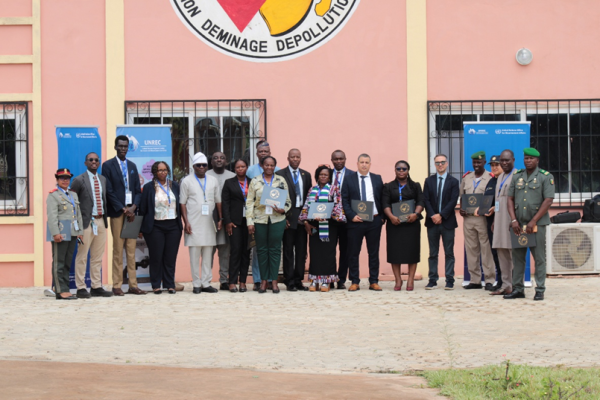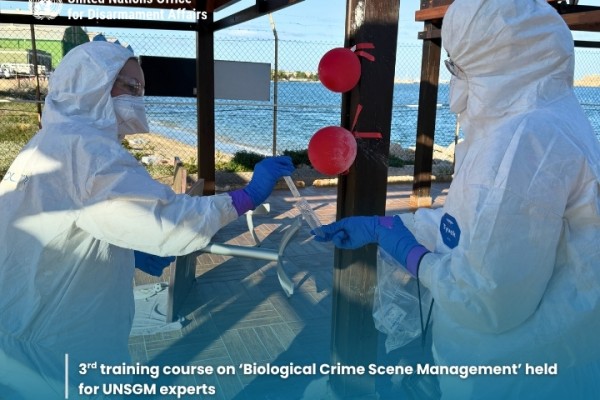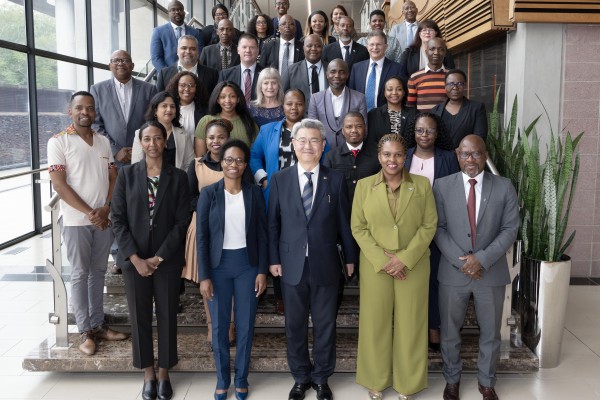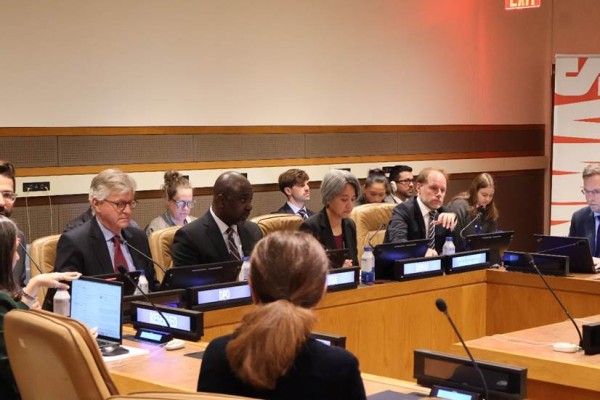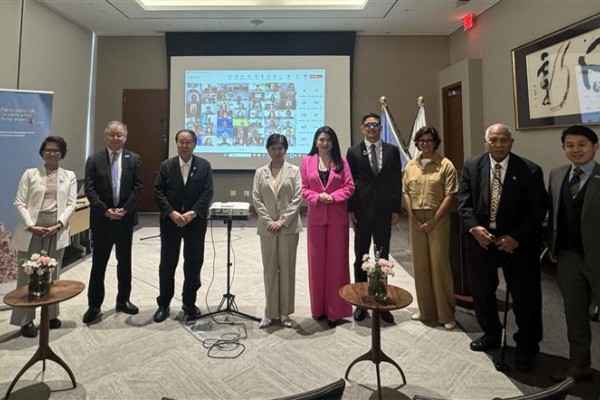في 17 تشرين الأول/أكتوبر، اختُتم منتدى الأمم المتحدة للشباب من أجل نزع السلاح بحدث جانبي بقيادة الشباب بعنوان "المستقبل لن ينتظر: مسارات سياسات الشباب بشأن الأسلحة النووية والتكنولوجيا الناشئة" وقد جمع هذا الحدث مشاركين شباب وخبراء ودبلوماسيين من الشباب للاحتفال بتتويج أول منتدى للأمم المتحدة للشباب من أجل نزع السلاح، والذي أصبح ممكناً بفضل الدعم السياسي القوي والمالي السخي الذي قدمته حكومة جمهورية كوريا.
وقد أتاح هذا الحدث الجانبي الفرصة للمشاركين الشباب لتقديم مسودة وثيقتهم الختامية، وهي عبارة عن الخطوط العريضة للتحديات والتوصيات بشأن العلاقة بين الأسلحة النووية والتكنولوجيات الناشئة إلى مجموعة واسعة من أصحاب المصلحة المتعددين بمن فيهم الدبلوماسيون والخبراء التقنيون. وبمجرد الانتهاء من إعداد الوثيقة الختامية، سيتم تعميم الوثيقة الختامية على وفود اللجنة الأولى للجمعية العامة للأمم المتحدة في ديسمبر/كانون الأول 2025، كما ستُعرض على الموقع الإلكتروني لمكتب الأمم المتحدة لشؤون نزع السلاح.
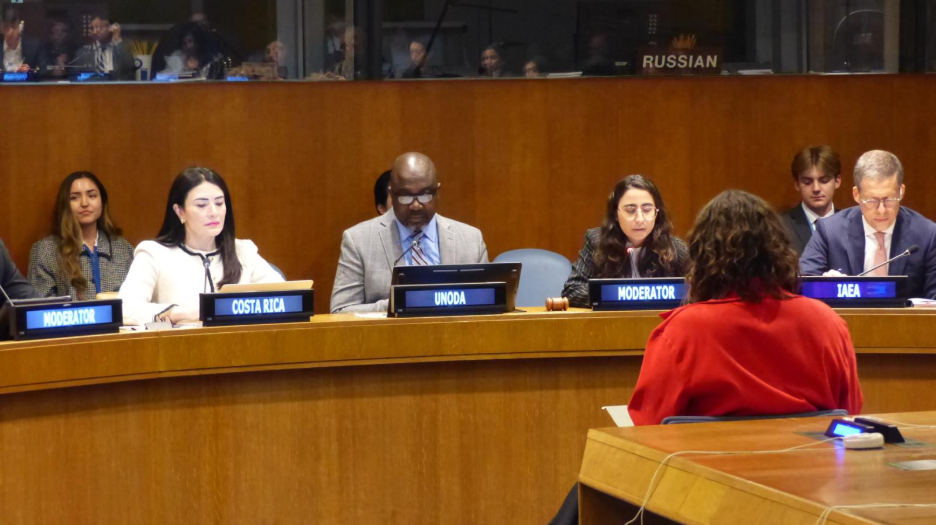
كانت الجلسة بقيادة الشباب بالكامل وأدارها السيد كاتليغو كوزا، مندوب شباب الأمم المتحدة في كندا، والسيدة فيكتوريا فان سوزا غيماريش، خريجة صندوق القيادات الشبابية من أجل عالم خالٍ من الأسلحة النووية التابع لمكتب الأمم المتحدة لشؤون نزع السلاح. وقاموا معًا بإرشاد المشاركين وأعضاء اللجنة إلى النتائج والتوصيات الرئيسية للوثيقة الختامية.
وألقى الكلمة الافتتاحية السيد أديديجي إيبو، مدير ونائب الممثل السامي لشؤون نزع السلاح، الذي هنأ المشاركين على ما أحرزوه من تقدم وقيادة خلال المنتدى، قائلاً
"لقد شاهدتكم وأنتم تتولون القيادة - من تصميم جلسات المنتدى إلى صياغة التوصيات الواردة في الوثيقة الختامية. لقد قمتم بقيادة تصميم المنتدى وتنظيمه وطرحه، ويجب أن تفخروا بالتأثير الهائل الذي كان لكم في تشكيل هذه المبادرة"
وبعد الملاحظات الافتتاحية، قدم السيد أوليس ريتشارد، خريج صندوق القادة الشباب من أجل عالم خالٍ من الأسلحة النووية، والسيدة ألين روي، الرئيسة المشاركة في مؤسسة "يوث فيوجن"، النتائج الرئيسية لمسودة الوثيقة الختامية. وقد حددا التحديات الرئيسية، بما في ذلك الافتقار إلى الحوكمة فيما يتعلق بالذكاء الاصطناعي والتكنولوجيات الناشئة، فضلاً عن الحاجة إلى تعزيز إشراك الشباب في صنع سياسات نزع السلاح. وقدمت مسودة الوثيقة الختامية توصيات تتراوح بين وضع تعهدات متعددة الأطراف بعدم دمج الذكاء الاصطناعي في الوظائف النووية الحساسة وإضفاء الطابع المؤسسي على مشاركة الشباب ومبادرات بناء القدرات في مجال نزع السلاح.

عكس أعضاء الفريق الدبلوماسي والتقني هذه التوصيات. سلطت سعادة السيدة ماريتزا تشان، السفيرة والممثلة الدائمة لكوستاريكا لدى الأمم المتحدة، الضوء على أن الإقصاء في مناقشات نزع السلاح يمكن أن يؤدي إلى نقاط عمياء خطيرة، وحثت على زيادة مشاركة الشباب والنساء في السلام والأمن. وشددت السيدة باوينرات ماهاغونا، المستشارة في البعثة الدائمة لتايلاند لدى الأمم المتحدة، على الطبيعة المزدوجة للتكنولوجيات الناشئة حيث حذرت من مخاطرها، ولكن أيضًا من قدرتها على تعزيز الوصول العادل إلى الابتكار.
وأكدالسيد برايان توملينسون، السكرتير الثاني لشؤون نزع السلاح والسلام والأمن في البعثة الدائمة لكندا لدى الأمم المتحدة، على أهمية الشمولية وأشار إلى التحديات المستمرة في الحوار الإقليمي بشأن نزع السلاح. وأثنى السيد عمرو عصام، المستشار والمسؤول السياسي الأول في البعثة الدائمة لمصر لدى الأمم المتحدة، على عمل المشاركين وأكد على أهمية استبعاد الذكاء الاصطناعي من أنظمة القيادة والسيطرة والاتصالات النووية.
كما تبادل الخبراء التقنيون وجهات نظرهم. وأثنى السيد نونو لوزيو، نائب مدير مكتب الاتصال التابع للوكالة الدولية للطاقة الذرية، على المشاركين وأشار إلى أنه في حين أن الذكاء الاصطناعي لا يمكن أن يحل محل الخبرة البشرية، إلا أنه يمكن أن يدعم المفتشين ويحسن التحليل المفتوح المصدر. وشجّع السيد تشارلز أبيشي أوكو، كبير موظفي الاتصال في منظمة معاهدة الحظر الشامل للتجارب النووية، على برامج الإرشاد لتعزيز مشاركة المرأة في مجال نزع السلاح. وشدد السيد أولاميد صموئيل، أخصائي الشبكة في الشبكة النووية المفتوحة، على أهمية المنصات التي تتيح الحوار في الوقت الحقيقي بشأن التكنولوجيات الناشئة والأمن.
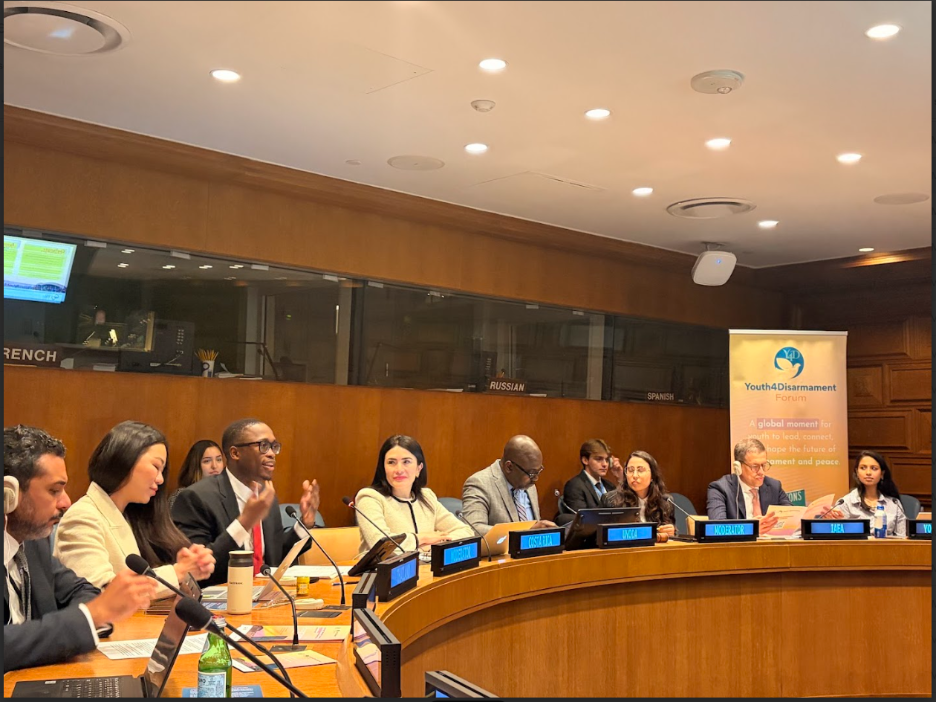
قدم أعضاء حلقة النقاش بشكل جماعي توصيات وملاحظات لإثراء المسودة النهائية للوثيقة الختامية والمسارات المستقبلية للمشاركين الشباب. ودعوا إلى إنشاء شبكات إقليمية ودولية للشباب، وبرامج تنمية المهارات القيادية، والاستخدام الاستراتيجي لوسائل التواصل الاجتماعي لتضخيم رسائل وزخم نزع السلاح.
يعمل المشاركون في المنتدى الآن على إدماج هذه الملاحظات في الوثيقة الختامية للمنتدى التي ستوضع في صيغتها النهائية للنشر بحلول ديسمبر 2025. وبمجرد الانتهاء منها، سيتم نشر الوثيقة الختامية على المواقع الإلكترونية لمكتب الأمم المتحدة لشؤون نزع السلاح وقنوات التواصل الاجتماعي وتعميمها على وفود لجنة الأمم المتحدة الأولى المعنية بنزع السلاح والأمن الدولي.
وبعد انتهاء الحدث الجانبي، ألقيت كلمات ختامية من قبل الدبلوماسيين والمشاركين تتويجاً لنهاية المنتدى في الحفل الختامي. وأشاد سعادة السيد سي جين سونغ، الممثل الدائم لجمهورية كوريا لدى مؤتمر نزع السلاح، بالمشاركين على مساهماتهم وأكد من جديد دعم بلاده لمشاركة الشباب في جهود نزع السلاح العالمية. وشدد على أهمية المنتدى والوثيقة الختامية كخطوات نحو بناء شبكة عالمية من الشباب المناصرين لنزع السلاح. وفي ختام المنتدى، ترك للمشاركين رسالة مفادها أن يظلوا مصممين على بناء مستقبل أكثر إشراقا.
